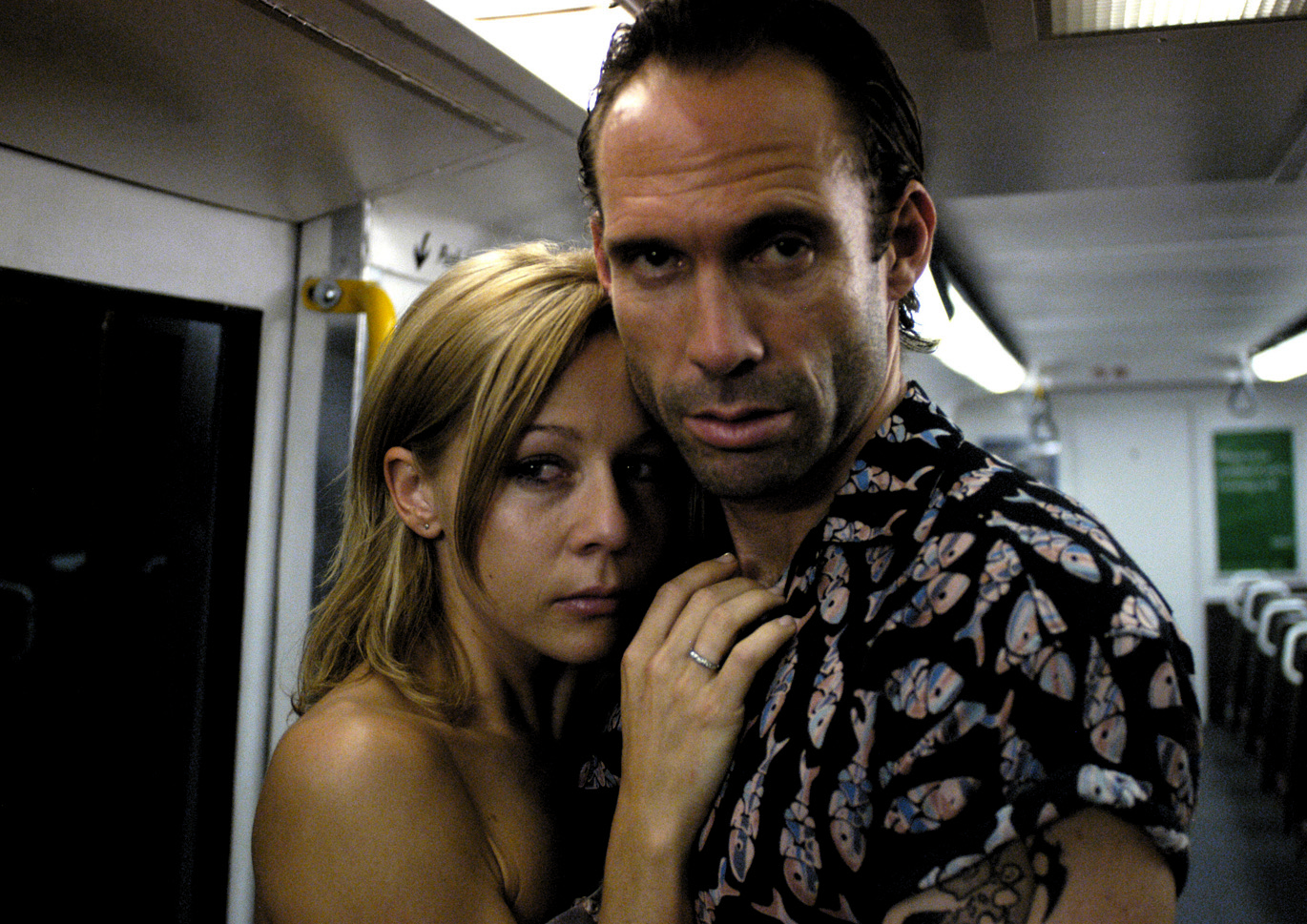‘When I was getting money for Last Train to Freo,’ says Jeremy Sims, ‘the first thing that everyone in the film world said was ‘It’s not cinematic enough. You’ve got to open it out, you’ve got to let them out of the carriage, let people in, think of other ways to solve it.’ I listened to all that for quite a long time and then I basically decided to do exactly the opposite. And not only was I going to keep all the characters on the train, but I wasn’t going to let the camera off the train either.’
Statements like the one above would be pretty bold from anyone, let alone a director embarking on his debut film. However, Jeremy Sims has been living inside the last train to Freo for a long time now, and it is his deep familiarity with the material that gives him confidence. As the original director of Reg Cribb’s play The Return, Sims was well aware of the story’s strengths and weaknesses when he and Cribb began adapting it for the cinema. This didn’t completely allay what he refers to as ‘a lot of fear and trepidation’ from the money-men, but he was determined to stick to his guns. ‘In the end, I had to say, you’re going to have to trust me on this,’ he says. ‘What’s not cinematic is to stay between two stools and do a little bit of each. What is cinematic is to say my principal weapon is the sense of claustrophobia and the sense of intimacy from within that carriage.’
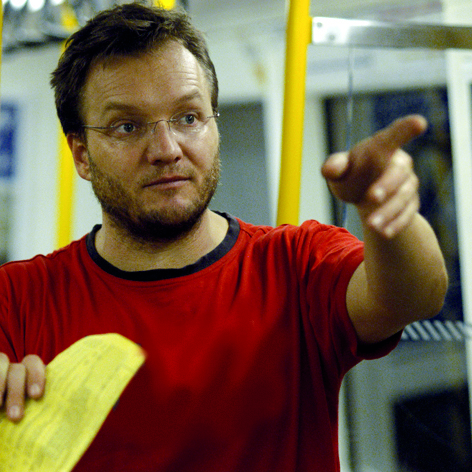
On a deeper level it is also clear that the carriage in which Sims traps his characters was not a setting chosen lightly. ‘If Reg and I have a general theme to our work,’ says Sims, ‘it is about trying to explore what the Australian psyche is, and who we are, and why it has become so shallow in the last twenty years.’ Thus, although the eponymous train is neat, tidy and should be a pleasure to travel on, the corporate culture it represents clashes with the people that don’t fit that neat and tidy world. Consequently Last Train to Freo feels like a very angry piece of work, and although Sims has stated that it isn’t intended as a message film, he guardedly admits that some of that anger is his own. When I ask what’s making him so angry, he laughs. ‘Look, a lot of it’s Reg’s,’ he says. ‘The original play was written not long after his brother had died, so that’s the parallel with the [writer character in Freo].’ He quickly assures me that Cribb’s brother didn’t die in a violent incident with a thug and then continues:
It’s also very important that it be set in Perth because those of us that are from Perth who go back occasionally … it really is a generally isolated city, and there’s a strange feel to me about Perth. And when you’re from there – Reg and I both feel the same way – that there’s something missing from a place that has that much money and that little history. So it comes from that place as well.
There is a long pause as he considers the best way to articulate what comes next:
I think that the anger really comes from a general perception in Australian society that where we’re from or what our sense of belonging might be is not an important debate. That there’s this anti-intellectualism in Australia now, that’s been fostered particularly over the last ten years, that says that ‘our sense of belonging is a puerile thing to pursue’.
‘If Reg and I have a general theme to our work,’ says Sims, ‘it is about trying to explore what the Australian psyche is, and who we are, and why it has become so shallow in the last twenty years.’
I note that there’s a particular attitude that would have us believe what’s past is past and that where you belong is simply where you are right now. Sims nods in agreement and relates it to the film. The sequence that he quotes sees the Tall Thug ask his fellow travellers, ‘Who are my people?’ His mate Trev replies, ‘You’re from a people.’ ‘Where?’ demands the Thug. ‘Midland’, Trev answers. The Thug is unimpressed, saying that Midland is a suburb, not a people. ‘Who do you think lives in a suburb?’ Trev retorts. ‘People. Your people are the Midland people.’ Sims smiles, relishing the subtext. ‘And that drives him crazy,’ he concludes. ‘Because he knows he’s from some other place, and it’s certainly not from Midland.’
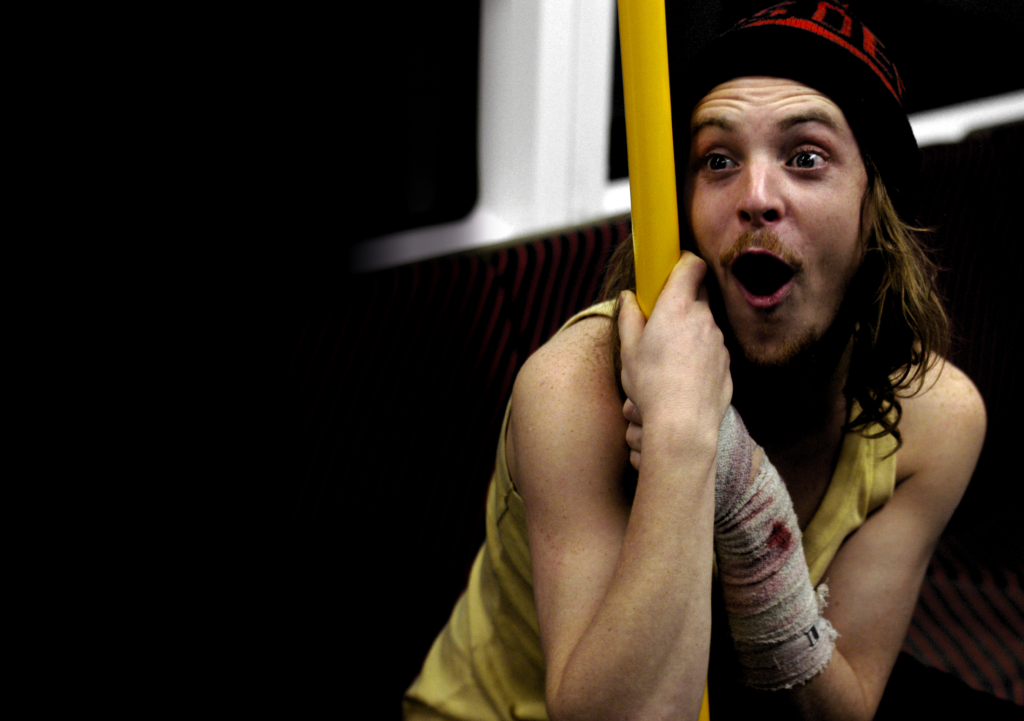
Steve le Marquand’s performance as the Tall Thug is what drives the film, and it is the craziness that Sims identifies that makes the role so challenging. If the performance were too small, then the story would seem emasculated. On the other hand, if it were too large the Thug could simply become an overbearing ranter. The balance is the key, and I ask whether maintaining that balance was difficult. ‘I love big performances on screen,’ Sims says.
I don’t think there’s any reason why you can’t have them – they’ve just got to be truthful. Steve’s performance in the film is actually very different to what he did five years before onstage. It took me a while to break down Steve’s patterns from having done the play, which was incredibly successful and which he was brilliant in, and for which reason he, I think, was fairly certain that he knew how this character should be played. It was my job, and it’s to Steve’s credit, that he allowed me to convince him that it wasn’t necessarily what we needed for the film …
Then when we started working on it properly, a) he worked harder than any actor I’ve ever seen in all of my time, and b) he was incredibly generous and brave in that he let me take him on a journey that he probably wasn’t able to take on his own, and I wasn’t able to make anyone else go on except him. So it was a really symbiotic relationship.
Of particular importance was Sims’ desire to tease out the tensions between what he sees as the Thug’s admirable qualities and his delight in bullying the other characters on the carriage. ‘Steve’s anger – in any other society that wasn’t as smug and wealthy and prepared to block out any bad thoughts, he would be a prince,’ Sims explains.
He would be necessary to society because he’s strong, he’s intelligent, he’s courageous, he’s all those things that Achilles or Ulysses or King Arthur or any of those great kind of mythical heroes are. But there’s no place for him in modern society … What he doesn’t see about himself is that his anger is uncontrollable and that his self-aggrandisement is pathological. He doesn’t see that.
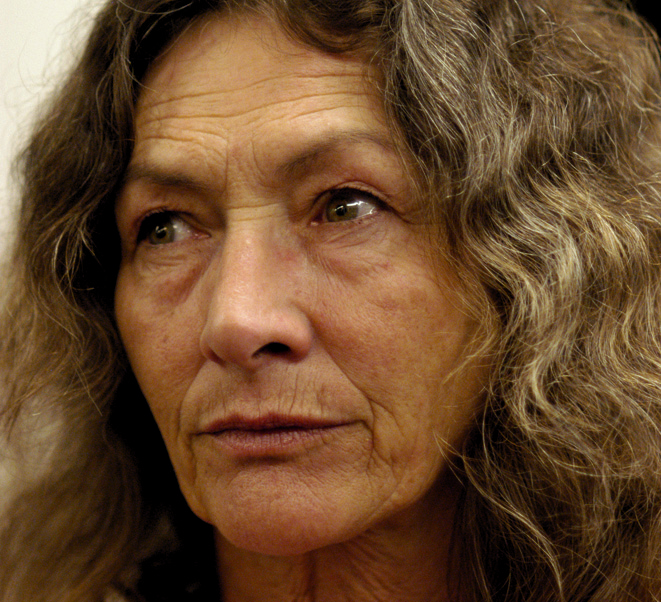
Given his preoccupation with Australia’s national identity and the search for belonging, I ask Sims where he feels that he belongs. ‘My parents are English and I’m Australian and I’m from Perth and I live in Sydney,’ he begins.
So my struggle for belonging is a general one that I think Australia generally feels as well. I got very interested in Aboriginal history and Australian history twenty years ago, and they’re kind of my special subjects – political and social history of Australia. I’m really fascinated by where we come from, you know? We were founded by criminals and whores and bloodthirsty officers and third-rate aristocrats. The aristocrats that couldn’t cut it in the Europe that was set up for aristocrats.
We wiped out an incredibly unique civilization, the oldest on the planet. Then we discovered lots of wealth and money from wheat and wool and iron ore and so suddenly we were rich as well. We threw away our British heritage and suddenly grabbed at an American one that we don’t understand. We’ve never really had to fight for our independence … there’s all kinds of things that make Australia unique. And it’s such a young country that I think anyone that tells you, ‘Who we are is over. Who we are is a debate that’s finished and not interesting,’ is kidding themselves. Because it’s only just begun as far as I’m concerned.
With this acute awareness of the many contradictions competing to form a coherent national identity, I ask Sims if he feels somewhat disconnected. ‘I think Steve feels disconnected and he couldn’t be more Australian,’ he responds, before pausing to think.
You have friends who are first- or second-generation Australians whose parents are Croatian or Italian or Greek. They have this lovely kind of dual identity, and which you’re more than encouraged to celebrate in Australia. It’s called multiculturalism. But if your parents are English and you’re first-generation Australian … it’s a kind of nowhere land, despite the fact that the originating culture of the nation is British. So it is difficult to work out who your heroes are or where your myths come from.
I know the British tradition very well; English tradition of literature and music and myth and all of those things, and I don’t necessarily feel connected to it. I’m really fascinated by Aboriginal mythology and the idea of song lines and a society based on storytelling; it really excites me. When you discover that really that’s all they did, and that all of their myths and all of their stories, all their social values, all of the rules, all of their laws, they were all bound up just in stories because they didn’t write any of them down – I find that fascinating.
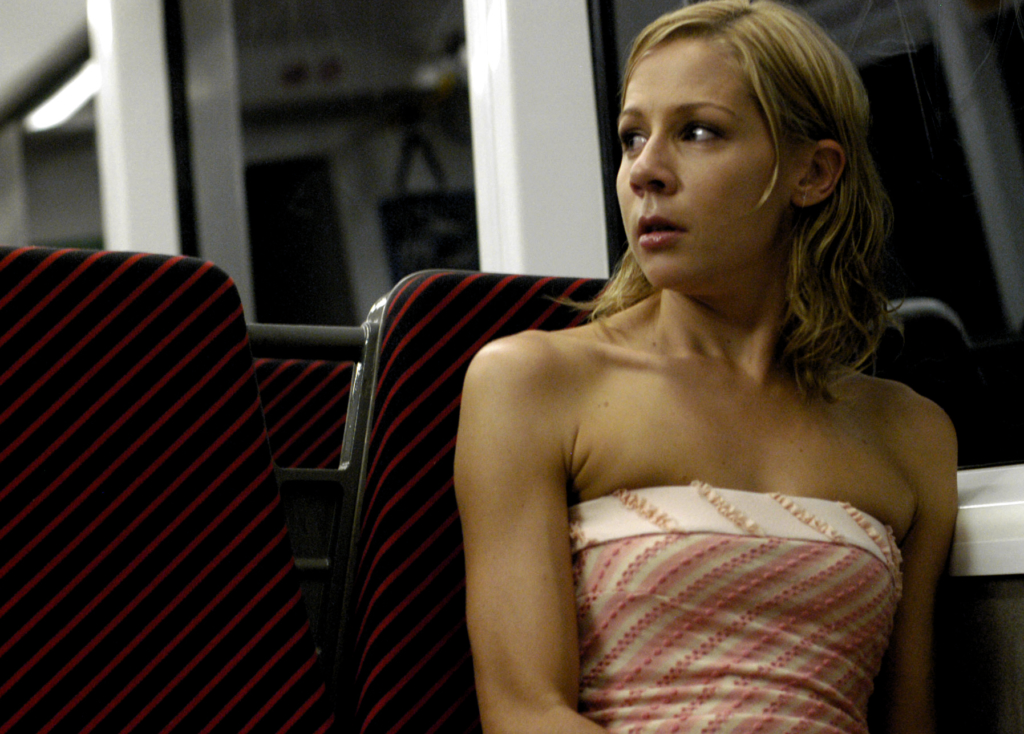
In light of this I mention that I found it interesting that the Tall Thug also identifies with an ancient culture – not the Aboriginals, as might be expected, but that of the Apaches. ‘That’s one of my favourite bits of writing in it,’ Sims nods.
It’s Reg’s way of saying, ‘Look how fuckin’ disconnected we are.’ There’s this intelligent, powerful, disenfranchised Australian man, and at his disposal he’s got one of the most disenfranchised and amazing people on the planet. But because we’ve managed to convince ourselves that they didn’t fight back, or that they didn’t have any pride or courage, he’s decided to identify with an Apache warrior. And there’s so many people like him that wear Maori tattoos or Apache warriors’, and really there’s absolutely no respect for our indigenous culture here at all.
Throughout our conversation I’ve noticed that Sims has always referred to Last Train to Freo’s lead character as ‘Steve’. While this moniker is obviously a carryover from The Return (with Steve le Marquand even wondering whether the role was named after him), he’s never named on screen and the end credits simply dub him the Tall Thug. Given the story’s admitted mythical undertones, I ask if this decision was motivated by the desire to make the character more of an archetype. ‘Yeah, absolutely,’ Sims confirms.
My background is in telling mythical tales on stage and in playing them. This is not realism, this film, and the only criticism I’ve had of the film is from people that don’t understand it’s a heightened realism. It’s an allegorical, mythical piece that is meant to show situations that are almost archetypes. The character of Steve, I just wanted to make sure that he felt like Odysseus. He’s trying to get home on the boat and these incidents happen along the way and he can’t help but either solve them or ponder them or fight for them. But bottom line is that he is a mythical character who’s meant to represent everything that is good and bad about the Australian male.
With its strange mix of the epic and the intimate, no one is more aware than Sims that Last Train to Freo was an odd story for him to tell. ‘A real-time drama, all dialogue, in eighty-five minutes, a feature – red flags going up all over the place,’ he admits. But when he sees the effect that the film has on an audience, it is also clear that he feels he has pulled off something that no one initially thought he could do.
I’m so thrilled that, by the response the film is getting, it now feels to me like we kind of did everything that we could with this picture. That we wrung every possible bit of juice out of the story. People really, really enjoy their eighty-five minutes in the cinema. They come out and you can see they definitely go, ‘Wow that was really interesting – I’m really glad I went and saw that’. And for a storyteller, that’s what you want, that’s really what you want.
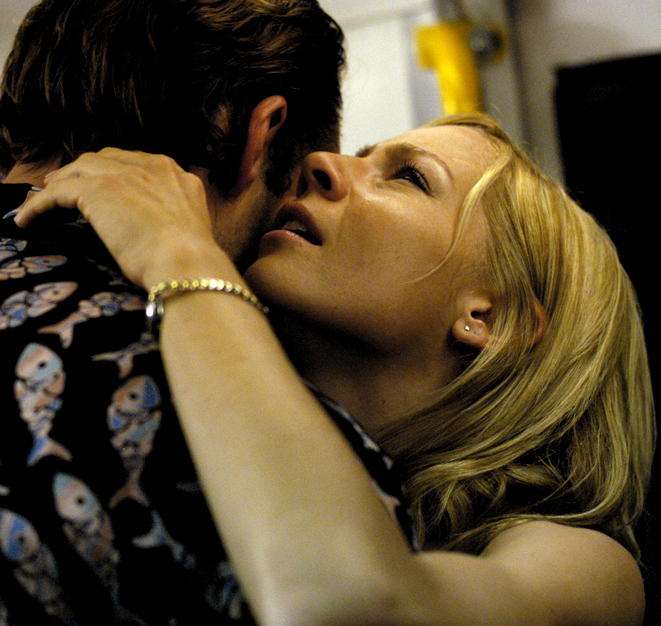
Thug Life: Last Train to Freo
Observing that a film feels like a piece of theatre is usually a criticism. However, although Last Train to Freo (Jeremy Sims, 2006) obviously began its life on the stage, to attack it for failing to observe the supposed rules of cinematic storytelling would be missing the point. It’s the tale that should matter rather than the style in which it’s told, and although the fierce concentration on its story’s primal core does make Freo feel theatrical, it’s also the key to its success. Put simply, this strategy of paring down narrative to its most basic levels reveals one of the oldest and most potent story models of all. Freo is a retelling of Little Red Riding Hood, a twenty-first century fairytale. Naturally the trappings are different – rather than a young girl venturing into the woods we see a young woman named Lisa (Gigi Edgley) get on the midnight train for Fremantle. But the point of the story remains the same: Lisa is travelling a path she knows well, but the path is dangerous. Wolves are waiting for her on this particular journey, and they think Lisa is good enough to eat.
The modern twist is that there are potential woodcutters in Lisa’s carriage but they don’t want to get involved. A middle-aged woman and a geeky young guy know they are no match for two musclebound hoons, and so they keep their heads down. Better to hope for the best, hope that the wolves won’t strike before their prey can escape. Moreover, the transit guards of Last Train to Freo are supposedly on strike, but in the post-privatization age their absence barely requires an explanation. As any veteran of public transport knows, getting on a train after dark is just like stepping into the woods: once you’re there, the wolves have you at their mercy. Thus, with these storytelling choices Sims creates an instantly recognizable urban nightmare. Last Train to Freo might not look like a horror story, but in many ways that’s exactly what it is, and by fusing fears that are both mythic and contemporary it quickly creates something resonant.
However the wolves that wait for Lisa on the train are far more than two-dimensional monsters. We’ve seen them before in Australian cinema, particularly in the last decade and a half. With our filmmakers’ gaze having shifted away from the bush to the suburbs, the men that lurk around the commission flats and public transport have become the new bogeymen. The thugs of Last Train to Freo could easily have stepped out of Romper Stomper (Geoffrey Wright, 1992), The Boys (Rowan Woods, 1998) or Idiot Box (David Caesar, 1996). Such films are itchy, unsettled, their central characters engaged in constant psychological warfare. In essence they’re about frustration, about men looking for something more and lashing out when they don’t get it. They also share a common atmosphere of claustrophobia, and the smart thing about the adaptation of Freo is that its innate theatricality is treated as an advantage. The strengths of its trapped-on-a-train premise are never going to be augmented by postcard shots of Perth; rather things will work far more effectively if the story remains concentrated. Thus director Jeremy Sims’ determination to work within artistic constraints is one of his most admirable achievements. Finding the right dramatic rhythms in a situation with such a small margin for error is tricky, and it is to his credit that although there is some occasional gear grinding (the tactic of having the Tall Thug suddenly scream at his fellow travellers quickly becomes repetitive), Freo’s basic storyline never loses focus.
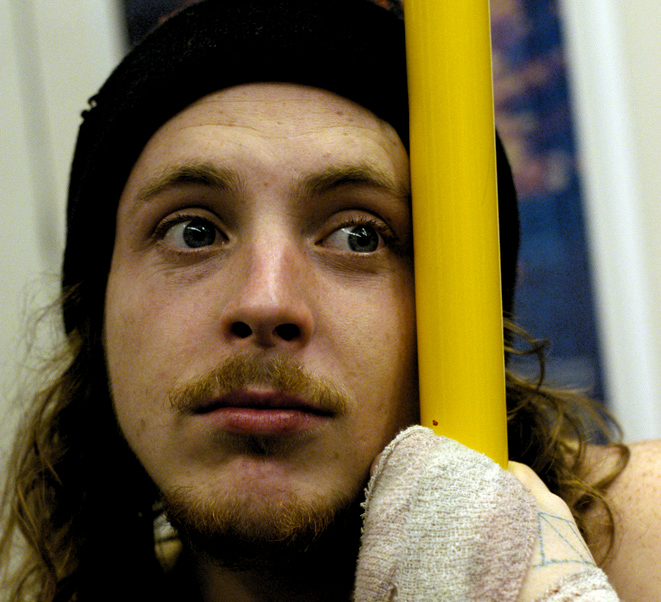
But just as there is something fundamentally impressive about transfixing an audience with the minimum of support, it is also fundamentally disappointing when new elements are finally added. The best analogy is probably watching a brilliant one-man show bring on another performer for the last five minutes: the new guy may be perfectly good, but the spell will still be broken. Essentially this is what happens in Freo’s last ten minutes. There are narrative twists and dramatic revelations, and they undeniably raise the stakes. However the key with plot developments at this stage is that they must feel organic, and unfortunately Freo’s third act feels a shade too contrived. Thankfully the misstep is not enough to derail the story, but it’s still something of a shame that the head of steam already worked up couldn’t be turned to better use.
What finally pushes the film over the line is intensity, with Sims drawing strong performances from his cast, the most laudable being that of Steve le Marquand. Cast as the story’s agent provocateur, it’s a plum role for an actor, but also one that is ripe for misjudgement. There’s a certain brand of theatre that apparently feels honour-bound to assault its audience, the best adjective for its overall style being ‘clenched’. Actors get in people’s faces, yell ‘fuck’ a lot and basically try to be as outrageous as possible. It’s a very attractive style to adopt because it seems to promise a direct conduit to raw drama, but it’s also a very short distance from being a poseur. The Tall Thug, with all his aggression and vulgarity, could easily be a role that is far more fun to play than to watch, and occasionally le Marquand crosses that line. Such lapses are small however, and for the most part we see an actor skilfully negotiating the nuanced area between being a bullshit artist and playing one. Even more impressively, it is almost entirely the raw energy of le Marquand’s performance that makes the slightly dodgy ending work as well as it does, and in the quieter moments of the story he touches greatness. The sequence in which he listens to Maureen (Gillian Jones) during a breakdown on the line is the most memorable, perhaps because it is the scene with the least amount of artifice. The characters all drop their masks while the lights are down, and a film full of bluster allows itself a welcome moment of quiet.
Like Lisa’s wolves, Last Train to Freo is an angry, frequently ugly piece of work, but it’s also surprisingly smart. It’s at its best when it deliberately tries to foreground these contradictions; the heavy subject matter handled with a light touch. Things like the constant soundtrack of classical music that undercuts the air of savagery, the intelligence hidden behind crude braggadocio and the gradual unpeeling of all the characters’ motivations are what keep it surprising. It’s certainly not perfect, but to dwell on the film’s failures would be churlish. This is a passionate, fiercely individual story that couldn’t take place anywhere else. It is determinedly rough around the edges without being coarse, and it hauls the audience into a universe that is never, ever boring. In short, the kind of cinema that I wish more Australian filmmakers were trying to deliver.
